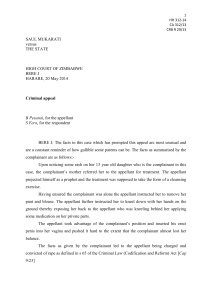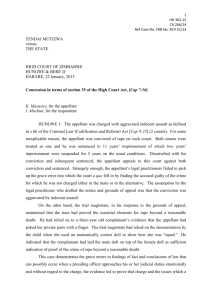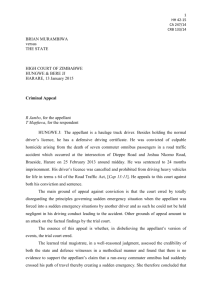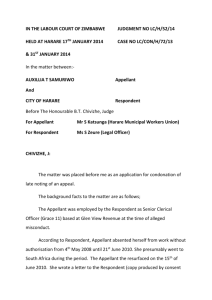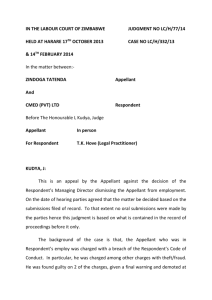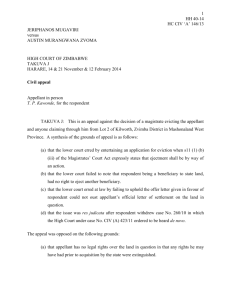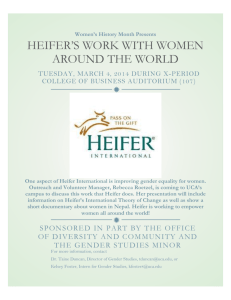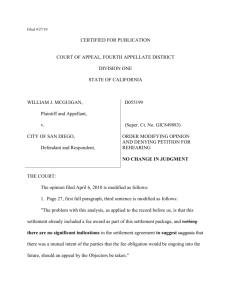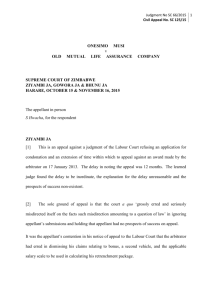HH 467-15
advertisement
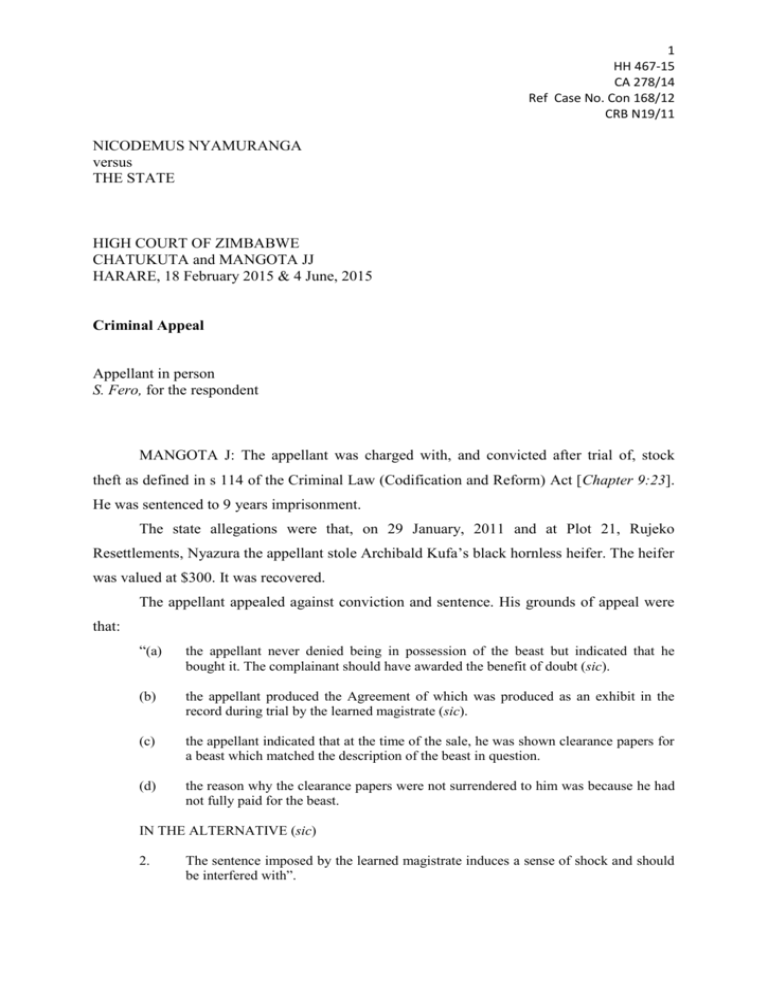
1 HH 467-15 CA 278/14 Ref Case No. Con 168/12 CRB N19/11 NICODEMUS NYAMURANGA versus THE STATE HIGH COURT OF ZIMBABWE CHATUKUTA and MANGOTA JJ HARARE, 18 February 2015 & 4 June, 2015 Criminal Appeal Appellant in person S. Fero, for the respondent MANGOTA J: The appellant was charged with, and convicted after trial of, stock theft as defined in s 114 of the Criminal Law (Codification and Reform) Act [Chapter 9:23]. He was sentenced to 9 years imprisonment. The state allegations were that, on 29 January, 2011 and at Plot 21, Rujeko Resettlements, Nyazura the appellant stole Archibald Kufa’s black hornless heifer. The heifer was valued at $300. It was recovered. The appellant appealed against conviction and sentence. His grounds of appeal were that: “(a) the appellant never denied being in possession of the beast but indicated that he bought it. The complainant should have awarded the benefit of doubt (sic). (b) the appellant produced the Agreement of which was produced as an exhibit in the record during trial by the learned magistrate (sic). (c) the appellant indicated that at the time of the sale, he was shown clearance papers for a beast which matched the description of the beast in question. (d) the reason why the clearance papers were not surrendered to him was because he had not fully paid for the beast. IN THE ALTERNATIVE (sic) 2. The sentence imposed by the learned magistrate induces a sense of shock and should be interfered with”. 2 HH 467-15 CA 278/14 Ref Case No. Con 168/12 CRB N19/11 The respondent stated that the appellant was properly convicted and sentenced. It submitted that the appeal was devoid of merit. It urged the court not to quash the conviction or disturb the sentence. There was no direct evidence which linked the appellant to the offence. The state, therefore, proved its case by way of circumstantial evidence. Uchena J articulated in S v Tambo 2007(2) ZLR 33(H) the requirements to be established. He remarked: “circumstantial evidence can only be used to draw an inference if the inference sought to be drawn is the only reasonable inference which can be drawn from those facts. The inference must be supported by a rational reasoning and an analysis of the proved facts”. The court a quo in the present matter found the following to have been the proved facts of this case: (i) during the night of 9 January, 2011 the complainant’s small, black, hornless heifer was stolen from his cattle pen, (ii) on the morning of 30 January, 2011 the appellant exchanged the heifer with one Samuel Maheu Ndiyamba’s brown ox – and (iii) the complainant and the police recovered the heifer from Mr Ndiyamba’s homestead on 12 February, 2011. The state produced a document which confirmed the transaction which took place between the appellant and Mr Ndiyamba. The court a quo marked it exh 1. It is dated 30 January, 2011. Its contents read: “DATED 30/1/11 Mr N. Nyamuranga I.D. No. 42-210112F42. I exchanged one black heifer without horns with one brown ox with horns facing upwards (sic) to Mr Maheu Samuel Ndiyamba I.D. No. 58000470N42 with top up of $50 Fifty Dollars to be paid on 2/2/11” (emphasis added). Mr Ndiyamba’s evidence was that the appellant brought the heifer to him on the morning of 30 January, 2011. He said the appellant entered into the transaction which is captured in exh 1 with him. He stated that the appellant offered to pay him a top up fee of $50 as his ox was a lot bigger than the heifer. The appellant stated, as his first ground of appeal, that he bought the bovine from one Julius Muhuma. He said he purchased it in mid-October, 2010. Mr Muhuma denied having ever sold any bovine to him. 3 HH 467-15 CA 278/14 Ref Case No. Con 168/12 CRB N19/11 The transaction which pertained to the complainant’s heifer took place on 30 January, 2011. The transaction which related to the bovine which the appellant said he purchased from Mr Muhuma allegedly took place some two or so months prior to the theft of the complainant’s heifer. The matters are separate and distinct from each other. It follows, from the foregoing, that the appellant was being economic with the truth on the point that he purchased a bovine from Mr Muhuma. He confused two issues which were not related to each other. The bovine which formed the subject of this appeal was clearly identified by the complainant as his heifer. The court is satisfied with the complainant’s evidence in that regard. The appellant’s second ground of appeal related to the document which the state produced as an exhibit. The ground read “the appellant produced the Agreement of which was produced as an exhibit in the record during trial by the learned magistrate” (sic). The court could not appreciate what he intended to achieve by stating as he did in respect of the exhibit. The state, and not him, produced the exhibit. Its contents connected him to the offence in an irrefutable way. The appellant’s third and fourth grounds of appeal said nothing which was worthy of the court’s attention. The two grounds were haphazardly couched. They were more of explanations than they were grounds of appeal. There is no doubt that the proved facts of this case are on all fours with Uchena J’s remarks in S v Tambo (supra). They point to the inescapable conclusion that the appellant stole the complainant’s heifer. The court a quo did not misdirect itself at all when it convicted him of stock theft. The conviction is confirmed. The appellant stated in his Notice of Appeal that he was appealing against conviction only. He, for some unexplained reasons, made reference to the sentence which had been imposed. He couched his ground of appeal against sentence in the following words: “IN THE ALTERNATIVE 2. The sentence imposed by the learned magistrate induces a sense of shock and should be interfered with”. One could not tell if he was appealing against conviction only or against conviction and sentence. He couched his ground of appeal against sentence in the words “In the Alternative”. Whatever those words were meant to convey remains anyone’s guess. He 4 HH 467-15 CA 278/14 Ref Case No. Con 168/12 CRB N19/11 criticised the sentence which was imposed. He said it induced a sense of shock. He moved the court to interfere with it. He did so despite the fact that the trial court had inquired from him and established that no special circumstances existed in so far as his commission of the offence was concerned. He gave no reason at all for requesting the court to interfere with a statutorily provided mandatory minimum sentence. The respondent stated, and correctly so, that the appellant’s appeal was devoid of merit. The court agrees with the respondent’s submissions. The appellant’s criticism of the trial court’s conclusion was totally unwarranted. His story could not hold. He was, in our view, properly convicted and sentenced. The appeal is, accordingly, dismissed. CHATUKUTA J: agrees ……………………… National Prosecuting Authority, respondent’s legal practitioners

